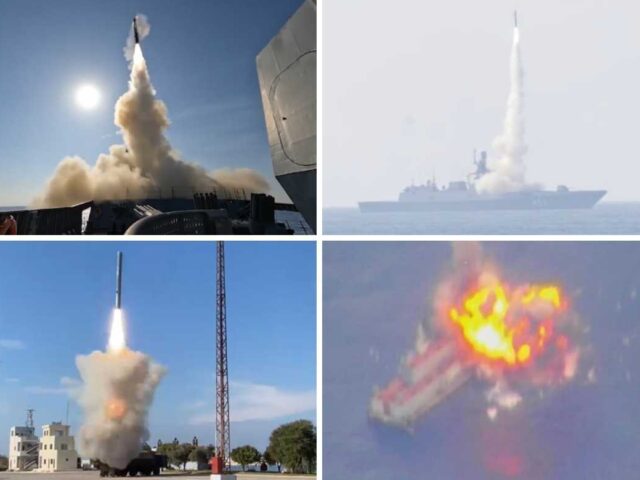Russia announced live-fire exercised by four of its nuclear-capable missile systems in the Eastern Mediterranean off Syria on Tuesday, an apparent show of force as dictator Bashar al-Assad’s client state comes under pressure from Islamist terrorists.
Russian warships, aircraft, and coastal troops launched missiles in and around Syria in a significant drill which appeared to be a show of force on behalf of its client state Syria, a demonstration of the type recently also performed by Russian forces elsewhere and interpreted as a warning against Ukraine.
The three days of exercises were described by the Kremlin as “joint drills with the observance of international law and agreements with foreign states on the prevention of incidents at sea beyond the territorial waters and airspace above them”. Russia boasted 1,000 military personnel, ten ships and vessels, and 24 aircraft took part.
Footage released by the Kremlin and purporting to show the launches showed no more than three modern Russian frigates the Admiral Gorshkov, Admiral Golovko and the Admiral Grigorovich, as well as a small patrol boat type craft and several ex-Soviet era missile boats of the Syrian navy. No more than two combat aircraft were seen at any given time, both Mig-31 interceptors.

Erectors for what Russia said was a test by their Oniks anti-ship cruise missile in Syria / Russian Ministry of Defence

Launch of what Russia said was a test by their Oniks anti-ship cruise missile in Syria. Blurred areas at the top obscure military equipment standing at the head of floating piers for rapid embarkation. Alongside at the bottom-left of the image appears to be the container-loaded barge destroyed by a missile test in footage released by the Kremlin / Russian Ministry of Defence
All of the missiles shown launched can be adapted to carry nuclear warheads, although all — unlike the ballistic missile launch in November, which is primarily intended to deliver a nuclear payload — are meant for conventional warfare purposes. In at least one case a barge loaded with shipping containers at sea is shown being used as a target and exploding with great force.
One of the frigates fired from a vertical-launch cell what Moscow claimed was a Zircon hypersonic cruise missile, one of President Putin’s alleged “superweapons”, the exact qualities of which are a matter of debate. Designed as a ship-killer, the missile can also be used in land-attack role and is believed to be nuclear capable.
Russia said another missile was launched by submarine the Novorossiysk, one of Russia’s newer Kilo class diesel-electrics. This was claimed by Moscow to be a Kalibir missile, an all-purpose Russian cruise missile which has been used extensively in their war against Ukraine. Indeed, the missiles are seen as such a concern to Kyiv, they judge the effectiveness of their war against the Russian Navy in the Black Sea by how many Kalibir-capable ships Russia has in the region.
The Kalibir is too thought to be nuclear capable.
Also demonstrated by Russia in the Syria drills was a fair of Mig-31 jet interceptors carrying Kinzhal missiles. No launch was definitely shown in the Kremlin footage but Moscow claims it took place. The Kinzhal is another alleged hypersonic missile that has been deployed in Ukraine and which is believed to be nuclear capable.
The final demonstration was from Syria itself, the launch location of the land-based system easily identified as the Russian-leased naval base at Tartus, Syria. Stationed next to the Syrian navy’s elderly fleet of missile boats, a ‘Bastion’ type mobile launcher was said to fire an Oniks anti-ship cruise missile. Supersonic rather than hypersonic this time, once again the missile is reportedly capable of carrying a nuclear warhead.
The exercises have been interpreted by some as just the latest “warning to the West” by Putin’s Russia, and while it may fulfil this role too the timing and location appears to more closely link the launches to the renewed Syrian Civil War. Syrian dictator Bashar al-Assad has held onto his position for years due to significant military support from Moscow, and the sudden loss of the nation’s second city to Islamist militias comes as Russia’s focus has been decidedly elsewhere.
So the launches may be seen as Russia turning to the same — so far basically unsuccessful — deterrence strategy deployed by Moscow against the West to Syrian rebel groups instead, the reminder that they are squaring up to a nuclear power. It is also potentially intended as a counterpoint to some claims that Russia would be withdrawing its forces from Syria at the first sign of trouble, although of course that may yet happen.
As reported by Breitbart News of the suddenly fast-moving Syrian civil war:
The assault on Aleppo began with two car bombings and quickly escalated to skirmishes between the rebels and government troops. Syrian state media claimed a “major offensive” was repelled, while Turkish media said the rebels were able to reach the city center.
The U.N. Office for the Coordination of Humanitarian Affairs (OCHA) said Syrian government warplanes conducted at least 125 airstrikes across Idlib and western Aleppo since the offensive began three days ago. At least 12 civilians were killed and 46 wounded in these strikes, which forced 14,000 people from their homes.
As of Friday morning, HTS said it controlled dozens of towns in Idlib and western Aleppo, adding four more to its total in the past 24 hours of fighting.
International observers were surprised by the success of the offensive, which saw the rebels recapture territory they lost to Assad’s forces almost nine years ago.

COMMENTS
Please let us know if you're having issues with commenting.